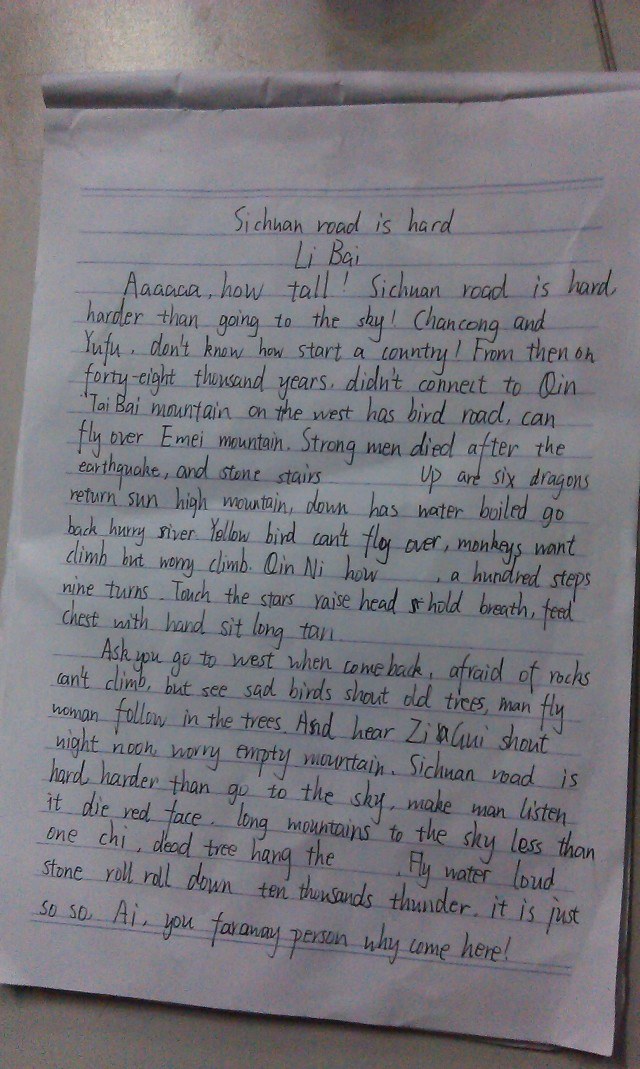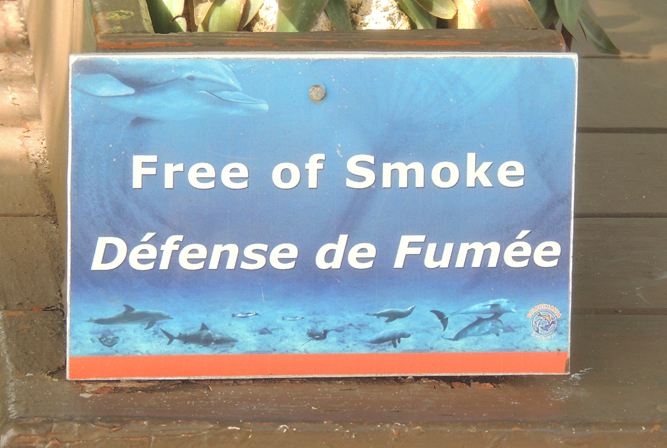Archive for Lost in translation
April 30, 2014 @ 11:04 am· Filed by Victor Mair under Language and advertising, Language and fashion, Language and food, Lost in translation
Paul Obrecht called to my attention the fact that the phrase "choke a small chili", which is widely used on Chinese wholesaling websites (especially for jewellery and accessories), gets 1.5 million Google hits (it received 307,000 ghits when I checked at 6:16 p.m. Tuesday evening, but that's still a lot for such an unusual expression).
Read the rest of this entry »
Permalink
April 30, 2014 @ 6:44 am· Filed by Mark Liberman under Lost in translation
In response to "Traductions de Merde" (4/26/2014), S.S. wrote to tell me about the Bad Translations Flickr group, which she runs. The picture below shows one of her favorite examples, where English mug in the nominal sense "A heavy cylindrical drinking cup usually having a handle" is translated into French as if it were the verbal sense "to rob at gunpoint or with the threat of violence", and auto in the sense of "automobile" is translated as if it were "automatic":

Read the rest of this entry »
Permalink
April 26, 2014 @ 6:56 am· Filed by Mark Liberman under Lost in translation
Fans of LL's Lost in Translation feature will enjoy the Facebook group Traductions de merde ("Shitty translations"), and a collection of the "Top 40 des traductions de merde" at topito.com. For example, there's an echo of the famous "Translate server error" signs:

Read the rest of this entry »
Permalink
April 24, 2014 @ 4:17 am· Filed by Victor Mair under Lost in translation
This is probably the most egregious of all Chinese-English translation fails:

Read the rest of this entry »
Permalink
April 22, 2014 @ 6:48 am· Filed by Victor Mair under Lost in translation
By now, the sinking of the South Korean MV Sewol on April 16, 2014, with 476 persons on board, is known to the whole world. Especially tragic is the fact that most of the passengers were high school students on an outing and that the ship's captain had behaved in an extremely irresponsible manner, resulting in the deaths of many individuals who might otherwise have been saved:
"South Korean President: Actions of sunken ferry captain 'akin to murder'".
Read the rest of this entry »
Permalink
April 18, 2014 @ 9:11 pm· Filed by Victor Mair under Lost in translation
Michael Johnson took this picture in Hong Kong between Queen's Road Central and the escalators:

Read the rest of this entry »
Permalink
April 14, 2014 @ 11:32 am· Filed by Geoffrey K. Pullum under Lost in translation
Wenn sounds a bit like when, but doesn't really mean "when" in German; it usually means "if". Wer sounds a bit like where, but it doesn't mean "where", it means "who". Sechs sounds like sex but doesn't mean "sex". Gift looks like gift but means "poison". Nothing is easy, even when dealing with languages as closely related as English and German (the curse of Babel really was a serious curse). I was reflecting on such matters yesterday as I waited to begin my journey on a fast train from Salzburg to Munich. How easy and natural it would be to make the wrong assumption about, for example, the meaning of the adjective gültig, which I had seen on my tickets and accompanying documents. And as if on cue, I suddenly heard the beautifully-spoken announcer tell us in English over the train's PA system that tickets of a certain category "are not guilty on this train."
Read the rest of this entry »
Permalink
April 7, 2014 @ 4:42 am· Filed by Geoffrey K. Pullum under Changing times, Grammar, Information technology, Language and computers, Lost in translation, Research tools, Resources
Gary Marcus and Ernest Davis say in a New York Times piece on why we shouldn't buy all the hype about the Big Data revolution in science:
Big data is at its best when analyzing things that are extremely common, but often falls short when analyzing things that are less common. For instance, programs that use big data to deal with text, such as search engines and translation programs, often rely heavily on something called trigrams: sequences of three words in a row (like "in a row"). Reliable statistical information can be compiled about common trigrams, precisely because they appear frequently. But no existing body of data will ever be large enough to include all the trigrams that people might use, because of the continuing inventiveness of language.
To select an example more or less at random, a book review that the actor Rob Lowe recently wrote for this newspaper contained nine trigrams such as "dumbed-down escapist fare" that had never before appeared anywhere in all the petabytes of text indexed by Google. To witness the limitations that big data can have with novelty, Google-translate "dumbed-down escapist fare" into German and then back into English: out comes the incoherent "scaled-flight fare." That is a long way from what Mr. Lowe intended — and from big data's aspirations for translation.
Read the rest of this entry »
Permalink
April 5, 2014 @ 3:44 pm· Filed by Victor Mair under Lost in translation
From Fangyi Cheng:

Read the rest of this entry »
Permalink
April 4, 2014 @ 1:35 pm· Filed by Victor Mair under Language and education, Language and literature, Lost in translation
Wei Shao sent me this photograph of the English translation of a famous Chinese poem:

(Click to embiggen.)
Read the rest of this entry »
Permalink
April 3, 2014 @ 12:28 am· Filed by Victor Mair under Lost in translation
Jì Xiànlín 季羨林 (1911-2009), an old friend of mine, was China's greatest Indologist and Tocharian specialist (see this Wikipedia article, also in Mandarin, Cantonese, and Classical Chinese). His complete works in 18 volumes, Jì Xiànlín quánjí 季羨林全集, are available through Amazon and other online book services. What is strange is that the English translation of the title is given in a number of places as Energize Complete Works.
Read the rest of this entry »
Permalink
March 29, 2014 @ 6:35 pm· Filed by Victor Mair under Lost in translation
The following photograph was taken at Dolphin Discovery on the island of Tortola in the British Virgin Islands:

Read the rest of this entry »
Permalink
March 26, 2014 @ 9:20 pm· Filed by Victor Mair under Lost in translation, Typography
John Considine found this circa 1880 advertisement in the Hong Kong 2013 catalog of Bernard Quaritch (with the note that "We have not been able to locate any other example of this kind of trade card"):

Read the rest of this entry »
Permalink







